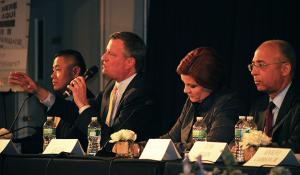Mayoral Candidates Respond to Low Income New Yorkers
The 2013 campaign to replace Michael Bloomberg was an opportunity for New York City voters to decide which candidate would help the city realize our collective aspirations. As the race took off in the early part of the year, the Center for Popular Democracy (CPD) and our allies in the City’s progressive community seized the opportunity to re-focus New York’s political dialogue on issues that matter to working families.
On February 28, in front of an energized and boisterous crowd of more than one thousand people, seven candidates for mayor spoke about their policy stances on the issues of poverty, workers’ rights, public education, and police misconduct. The event was moderated by WNYC’s Brian Lehrer and was co-sponsored by CPD, the Community Service Society, 32BJ SEIU, UnitedNY, and City Limits.
In what the New York Times described as “a lively and at times raucous forum,” the candidates spoke about their visions for a more equitable and prosperous city. The International Business Times called it “a rare opportunity for city residents at the lower end of the income scale to hear from their would-be mayors about their platforms for assisting people like them.”
The discussion echoed the issues raised by the report released two weeks earlier by CPD and UnitedNY, which laid out six policy prescriptions that the next administration should enact to address the continued challenges facing working New Yorkers.
The battle over guaranteeing paid sick days for New York City workers was at the top of the agenda. "It is precisely in a moment of economic crisis when people are hurting that we need paid sick day legislation passed," said Public Advocate Bill de Blasio. De Blasio called on City Council Speaker Christine Quinn to bring the paid sick days bill to a vote.
Comptroller John Liu received some of the loudest applause of the evening when he said that the minimum wage should be raised to $11.50 per hour. Any dip in the number of jobs would quickly disappear, he said, once consumer demand is boosted as a result of higher income for low-wage workers. The other candidates supported a minimum wage of $9.00.
Speaker Quinn spoke forcefully about her leadership in strengthening the City’s campaign finance laws to ensure that candidates are not bought by corporate interests or those who do business with the City.
In response to a question from members of Make the Road New York, all of the candidates called for changes to the NYPD’s stop-and-frisk practices. Both former Comptroller Bill Thompson and Public Advocate de Blasio spoke about the impact that the practices could have on their teenage sons. Thompson said stop-and-frisk “has been misused and abused” and Comptroller Liu called for it to end, saying “You can't deny that racial profiling is going on. We've got to put an end to this practice… At the end of the day it makes everybody less safe."
In response to a question from an immigrant car wash worker, all of the candidates expressed anger that minimum wage and overtime violations are rampant in the industry. Workers and advocates are calling on the City Council to pass the Car Wash Accountability Act to improve conditions in the industry.
The mayoral candidate forum played a particularly important role in the campaign for paid sick days legislation. The event further mobilized the progressive community in favor of the bill. Exactly one month after the forum, a compromise was reached between Speaker Quinn and the paid sick days coalition (to which CPD served as legal counsel) to pass legislation that would give 1.4 million New Yorkers sick days for the first time and guarantee the benefits for all other private sector workers in the City. Additionally, momentum built during the mayoral forum helped mobilize New York City Council members to override Mayor Bloomberg’s veto of the Community Safety Act, which banned racial profiling and instituted an inspector general over NYPD’s abusive “stop and frisk” tactics. The Mayoral forum, paid sick days campaign, and police accountability typify CPD’s mission of advancing a progressive, pro-worker, pro-immigrant, racial justice agenda in cities and states around the country.










